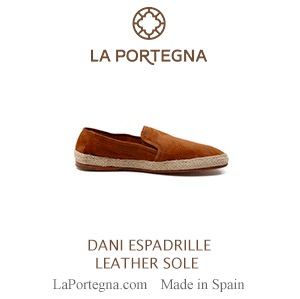Fashion and sustainability: Interview with Alex McIntosh
As part of our continued conversation on sustainability on PS, I thought it would be interesting to talk to someone that works on the academic side of fashion and the environment.
So through a friend, I got in touch with the Centre for Sustainable Fashion, a research centre at the London College of Fashion, and specifically with Alex McIntosh, who was one of the founders of the Centre.
Alex is interesting because as well as continued academic work, he also advises fashion businesses through consultancy, and bridges both the leading research and its application.
Permanent Style: Hi Alex, thanks for taking the time to talk. Could we begin with you telling us a little bit about the work the Centre does?
Alex McIntosh: Sure. There are teaching and research aspects to it. I’m not as involved as much as I was, but in my time I’ve seen a huge change in students, which the teaching side has helped foster. These days the fashion students see sustainability as a given - something every company needs an approach on.
I love that, because it shows how values and purpose are now a critical part of people’s decisions in the direction they’re taking their work - which was always what I wanted when I helped set up the Centre. And we used that to create an MA course for students, helping them study the ways sustainability can be part of a fashion business.
And the research side is separate to that?
Yes, although they’re always intertwined - because the whole point of research is to generate new knowledge, and if it’s genuinely new it will be something you want to apply and teach immediately.
The most interesting research at the Centre is probably done by a friend called Kate Fletcher, whose has tried to drive thinking away from the corporate and capitalist side of fashion. In her view, we need a new approach where the way we wear and use clothes is more important than where we buy them from, or how much they cost.
It’s almost a post-growth approach, which you might call true materialism. She does a lot of work on how people treat clothes after they’re purchased - how they’re cared for, laundered and repaired. And what that tells us about how we can effect those approaches more widely in society.
I think sometimes people struggle to realise how fundamental that is. They see it as cute - repairing your clothes and so on. But it’s much more profound than that: it’s a huge shift from focusing on shops, brands, designers, and more towards ourselves, wearing, owning, caring. Giving ourselves more agency.
There’s lots of other interesting research out there too, for example around changing production processes or end products to be more sustainable - someone like Modern Meadow that’s developing lab-grown leather for example.
How important do you think that kind of technological change will be in the future?
It will be important, but it’s easy to place too much emphasis on it. We need ecocentric change more - technical fixes are fun and exciting, but they’re not going to solve the climate crisis on their own. We need to go back to ourselves, because it’s cultural as much as technical.
And how does this research affect what businesses do?
You see it everywhere. With jeans companies like Levi’s or Nudie, for example - setting up repair shops, or APC years ago, who had a scheme where you could bring in your worn jeans and get a discount on new ones, and then they’d resell the worn ones.
The research helps show the cost of the production process, and convince companies to change or communicate to customers why the change is worth it.
I’ve spent a lot of time in my career producing clothes as well, and jeans are particularly ridiculous - you go to a factory and see all these people sanding jeans, to make us look like saddle-worn cowboys. It’s absurd.
Is the impact of the research related to public awareness? As in, you get a study in the news and then companies have to respond to it?
Normally no, it’s more slow and subtle. Often I’ll be working with a company and bringing up these kinds of issues, and they’ll reject them quickly - the change to working practices is too large. But then years later I’ll see them doing something similar, and the thought has clearly been there, and festered.
Converse, for example, did a whole ad campaign about customers and their worn shoes, how only after two years or so were they ‘really yours’. I worked with Nike, who obviously owned Converse for a long time, and we had a lot of conversations around these ideas. They never went anywhere at the time, but I don’t mind that. You can’t change a whole company in one go.
Academic research often helps give credibility to this kind of change as well. People are more likely to listen when you stand up and say, ‘I’m a Professor and I’ve been studying this for 10 years’. A lot of this is about ways to make people listen.
Fashion is very anthropological - it’s about how we see ourselves, how others see us, what the culture as a whole deems important. So it’s often slow moving.
How cynical should consumers be about the kind of campaigns you mentioned? Are some of them just greenwashing?
Greenwash is certainly a problem, particularly now as every company starts to feel they need to do something.
I was in the car yesterday (electric car, I should add!) and listening to an advert from Shell, about how if you buy a certain fuel they’ll plant trees, so you’re driving carbon neutral. And it really irritated me. It shouldn’t be OK for a fossil-fuel business to talk about how it’s creating a problem and then solving it again. We all know that’s not the answer, that we have to stop creating the problem in the first place.
However, in general I don’t think it pays to be that cynical. What we need is a series of nudges - where we can say that this is important, that it matters to everyone. And so when a business puts their head above the parapet, you shouldn’t just shoot them down, or not buy into it because you don’t believe they’ve really changed.
Everyone has agency here - and if you walk into Ralph Lauren and buy a polo shirt made from recycled bottles, it won’t change the company or the world, but you will show them (and yourself) that it matters - it will be the right little nudge.
I find that people often forget that all businesses are driven by trying to respond to what customers want, and what they will buy. Being efficient at that is the one thing capitalism does very well - more than politics in that respect.
Yes - while we’re living in this system, and there is no immediate alternative, we have to operate within it and be aware of how it works. That probably won’t be enough in the long term - the economic system will have to change - but that’s not an excuse for doing nothing.
How much is the solution just buying less? That was one conclusion of a recent interview we had on PS - that it’s less about which products and what they’re made of, and more just buying less of it.
It absolutely is, that’s at the heart of everything. I remember being at a discussion at the UN, and people talking round in circles about solutions, but central to all of it is just consuming less stuff, and therefore producing less.
You don’t have to buy nothing, just reduce what you buy and care for it more - take more interest in ownership.
The only thing we have to be careful with there is to avoid letting the luxury industry off the hook. Because even though people might buy less of it, they’re hugely responsible for driving attitudes to clothing.
And there are people who buy large volumes of luxury clothing too.
Absolutely. And there, the attitude is the same as fast fashion, with people defining themselves by what they buy, rather than how they use it.
What else can a responsible consumer do? Are there obvious certifications to look for?
There are so many, and the problem is they only certify one small part of the process - such as water usage, or animal cruelty. You’re talking about a very long, complicated chain.
In the end I think it has to be the responsibility of the company to explain third-party certifications, and the context. And the way you help as a consumer is taking the time to look at the information.
Businesses are all driven by getting you from the point of interest to the point of purchase as quickly as possible. They don’t want to interrupt that if they can help it. But if you look around, read the information on the site, then you’re helping give the right indicators - showing you want more.
It’s a particular problem in luxury. If you look at a lot of these companies’ corporate websites, there’s huge amounts of information about their policies and practices. But on the consumer-facing site, there’s nothing. They’re terrified of interrupting that dream, that aspiration.
There are lots of businesses starting to provide more information though: Far Fetch, Selfridges, Net a Porter. Just read it, shop on that basis, and give them the nudge.
Are these things less of a problem with menswear?
Yes, menswear is a much smaller problem, largely because men instinctively care more about functionality, how something is made - rather than just how it will look on a night out. So they tend to care more about quality, and buy less.
There is a growing ‘hype brand’ market among men, but most men are more like the typical Permanent Style reader, where there is real interest in provenance, craft and value. In a way, those customers are the ideal - it’s what we’re trying to turn everyone else into. Actually caring about the product and investigating it.
Still, that doesn’t mean you should stop learning about what you buy, and pushing companies to do better. You could investigate the impact of cashmere, for example: it’s a tiny part of the market, because it’s not produced in the volumes that cotton or polyester is, but it’s had a devastating effect on Mongolia. Largely because when the country stopped being communist, the subsidies for farming were removed and there was an incentive to produce as much as possible.
Stella McCartney stopped using cashmere recently for that reason. They looked at their environmental footprint and found cashmere was 1% of production, but 20% of their footprint.
It would take a lot of work for a company to unpack the impact of their cashmere, exactly where it comes from and how it’s farmed. The sourcing and trading is complex. But they’re more likely to start looking if you ask.
Do you have an example of someone that’s done that work, perhaps from your consultancy side?
I have to be a little careful as most of the work is confidential. Big companies often don’t like people knowing the work they’re doing in this area - or asking other people to do for them.
But one I can talk about is VF Corporation - which owns Timberland, North Face and Vans. I sit on their Responsible Sourcing Advisory Committee, which is largely concerned with trying to improve the lives of people in their supply chain.
They’ve made a huge investment in trying to understand that chain. And last year, as a result, they withdrew all their leather sourcing from Brazil (this is public knowledge) - because they couldn’t reliably say it wasn’t affecting deforestation in the Amazon.
It sounds simple, but understanding something like that is so complicated. Leather is basically a by product of the meat industry, as far as the slaughterhouses are concerned, so it gets thrown aside, collected up by traders, graded and traded, then goes through tanneries, so there’s no traceability as to where the skins came from (at least not outside Europe).
It was impressive taking that amount of time to investigate it, realising you’re not just a buyer at the end of a chain. But rather, standing up and saying because the product has your name on it, you’re responsible for everything all the way back to the animal. And after the product is bought as well - how it’s worn, used and repaired.
I’m not saying VF are perfect, they certainly aren’t, but it’s that kind of realisation of the extent of responsibility and of the problem, that we need.
For more information on Alex’s work under the Create Sustain consultancy, see their website and Instagram here.
The home of the Centre for Sustainable Fashion is here.



































Hello Simon
Timely. My goddaughter, Anna Roseblade, studied fashion and design in London and has now set up her own business (www.rosebladedesigns.co.uk) with sustainability as its central theme. She recently showcased her designs using repurposed denim at FashionShowLive, in parallel with London Fashion Week.
I was staggered when I learnt how much water is used to make just one pair of jeans.
I always wince a but when I read articles like this. I wonder what actual scientific qualifications Mr Mcintosh has to talk so confidently about ‘the climate crisis’? I wouls also wonder if he is even aware that there is a significant hody of eminent scientific opinion (Kapper, Easterbrook, Gavaia, et al) who are exteremly sceptical that such a crisis even exists, or that burning fossil fuels is in fact harmful to the planet – Kapper argues we are actually in a period of carbon drought (i.e. we need more not less carbon dioxide in the atmosphere). This may not be the place for an in depth discussion of such issues, and few would argue with good husbandry of the planet’s resources, but along with ‘greenwashing’ we need to be conscious of brainwashing too.
Thanks Phil. You’re right, this certainly isn’t the place for a conversation on climate change acceptance or denial
I realize that Permanent Style may not be the optimal place for discussion on the climate crisis. However, I wince at Phil’s posted comments.
Your characterization of the scientific literature is inaccurate. The overwhelming majority of scientific opinion favors the concept of global warming and unprecedented levels of atmospheric carbon with human activity as the primary cause. Several of the sources you site, Easterbrook, for example, made predictions that have been proven false with data in the last several years.
Yes, science relies on data and scientific models are not perfect. Regular reading of actual peer-reviewed science journals, such as Science and Nature, will reveal a regular stream of articles supporting rising carbon emissions, atmospheric levels, and consequences of these phenomenon. In fact, the predictions of models and expert opinion has significantly underestimated the extent of the problem in recent years.
This is a very real problem, despite the denial of many (who typically have a vested interest in not acknowledging the problem).
OK fine, one comment from the other point of view. Now no more. Thank you
100% in agreement Phil, but it doesn’t stop people from doing it anyway regrettably. The proper place for that debate is with the atmospheric scientists and climatologists. Humans have been disrupting the environment from the beginning, even when we lived in caves and huts. Sustainability is a buzzword that is all the rage, but as one commenter mentioned, it can be good business. If a manufacturer always looks for ways to reduce waste of resource inputs that will reduce costs. So good stewardship of resources has positive economic benefits as well. Overall, the readers of PS are a sophisticated group of people who appreciate how beautiful and well made clothing and accessories mature over years of use. In fact, it’s one of the most enjoyable aspects of owning quality clothing. To start a new season and put on a garment that you haven’t worn in six months is to enjoy and appreciate it all over again.
Interesting article Simon, and very happy to see you bringing in someone from CSF.
I am curious, though, given how much emphasis your blog is about tailoring and its quality; what are Alex’s thoughts on the sustainability in buying bespoke tailoring?
Best,
L
We didn’t discuss this specifically, but it’s fairly easy to see the good and the bad.
Good includes the fact it’s made to order, so no wastage, and lasts a long time so theoretically you need fewer of them.
Bad includes the carbon footprint if the fibre comes from Australia, or if the tailor flies to see you – plus the fact that bespoke customers don’t actually tend to consume fewer!
I have never understood the argument of bespoke items lasting longer. Why would a suit last longer just because it is bespoke? A 13/14 oz bespoke worsted suit will last longer than 9/10 oz RTW not because it is bespoke but because of the strength of the fabric. The longevity of a garment will depend upon its materials and how it is cared for – when it comes to alterations, even for bespoke there is only so much a change in wearer’s size can be addressed.
There are a few things which help Omar:
– Not just better outer materials, but better quality internal structure
– Better quality make in how the suit is put together
– Better aftercare, both in terms of easier alterations, but being able to have it altered and cared/repaired by the person that made it
But you’re right, those are all useless if someone doesn’t look after it, and the cloth is also a bigger factor than any of these other things
As said, I think a real interest in provenance, craft and value is key.
Every flaneur can play their part by buying well made products from reliable sources and looking after them.
Thanks Simon, I very much agree, except – and final word from me – the important issue is not climate change, but anthropogenic climate change; and it’s ‘scepticism’, not ‘denial’.
Thanks Phil, yes the first point was clear from your comment. And I disagree personally on the latter, as it’s very possible to have a sceptical approach yet think one way or the other. But to confirm, no more on this subject please (from anyone!)
Where do I start?
Mr McIntosh’s intentions may be noble, but his grasp of science is dodgy at best. He goes from sustainability to solving the climate crisis. I suppose he means that producing fewer jeans will require less cotton, so there will be a decrease in carbon dioxide emissions due to a decrease in cotton cultivation. How? Most carbon dioxide is emitted by 1) China and the tiger economies of Asia and Africa 2) in order to produce electricity. The cultivation of cotton and the production of cotton fabric are an infinitesimal part of global carbon dioxide emissions.
Which brings me to his comment about being in an electric car. Where does he think electricity comes from in the first place? If it was a car in the UK, chances are it came from burning fossil fuels.
In the world of menswear, sustainability is the new black. Now I’m all for making do and mending, and buying less. But to dress it up in modern eco-spiel is misleading, and does more harm than good. Because when people see through the marketing (and they increasingly do) they will dismiss all of the good science and facts on global warming and the climate crisis along with the nonsense.
Finally, the economic arguments aren’t very convincing.
Oh and it’s not just customers that drive sales. Companies shape customers’ tastes and choices.
The truth about ‘sustainability’ is this:
– Happiness doesn’t come from owning and buying lots of things. Buy fewer items. That’s if you can convince yourself about real happiness. The explosion of menswear blogs hasn’t exactly helped.
– Buy items that last. That way you’ll be saving money in the long run. Assuming you can afford them. If not, make do and buy cheap. It’s not your fault.
Bob, you’re arguing against extreme positions that Mr McIntosh doesn’t take.
He doesn’t say it’s just customers that drive sales. Or that producing fewer jeans will save the climate. Or that an electric car is carbon neutral.
Let’s have more reasonable comments if anyone has them, please, and less ranting
Great point Bob, but I think you may be underestimating the power the consumer would have to reduce carbon emissions. As you said most carbon dioxide, as well as other GHGs, are produced by China and other East Asian economies. Fair point, but a lot of that has to do with consumption, particularly from the West. So coming back to your point on ‘buy less buy better’, yes it does help curb emissions from these countries.
East Asia is now a major market for East Asian goods, so let us lay to rest this archaic notion that the East produces while the West buys. Three billion Chinese and Indians and Indonesians wear clothes, just like Westerners. Their middle class has boomed, and its consumption very nearly matches that of the Western middle class.
Mr Crompton, perhaps if you could bring Mr McIntosh to answer out questions, they wouldn’t sound like a rant. I’d like to know precisely what he means by sustainability. The whole interview is about sustainability, which is his field of specialty, but he never defines it. I would also like to know how he suggest that businesses, shops, craftsmen and tailors sustain themselves and their activity in the post-material economy. At some point they need to make a profit, or do I misunderstand him?
Bob, I think you are missing his point here. Since you were talking that most of the GHGs emissions is attributed to China and other East Asian economies, you can’t really blame these economies for its carbon footprint without looking at consumption in the West.
Also, his main point was consumer does have a bigger role than you think. I agree with him. As you said these East Asian economies have a booming middle class and they consumer as much as Westerners. You’re basically agreeing with him that in order to tackle climate change from a clothing point of view, they will need to reduce their consumption as well.
Hi Simon,
Buy less buy better. This runs through your blog and is the main reason I enjoy PS so much. Do you believe, as I think I do, that we (in the UK) have a particular responsibility in this respect compared to Scandinavia, Spain, Italy.. ?
Hey Daniel,
You mean because as a whole the UK is perhaps more commercial, and consumes more volume of clothing?
Yes exactly that particularly budget/ mid range and no sign unfortunately of things changing much. The concept of a larger initial outlay and looking after/ mending and avoiding extreme trends seems some way away..
Can’t we just talk about clothing? I’m so awfully tired of all of this eco-fustigus. It always just rings as so sanctimonious and preachy. I get that manufacturing X amount of whatever garment or accessory and then trashing it because it didn’t sell at yr desired price point is grotesque, likewise sanding denim trousers in factories and other such ludicrous nonsense that is perpetrated by manufacturers, but I also have no interest in wearing a shirt made from a plastic bottle, or buying into this head in the clouds academic self congratulation with its thinly veiled bolshevism…. I’d be more interested in discussions of how traditional manufacturing, craftsmanship, and production are and always have been sustainable and even positive for the environment, and for society in general and the man in particular. More jobs working making things instead of having them mass produced by automation or machines would actually be arguably better on all points, but that is another discussion which ties into economics and possibly even politics. Point being, I prefer discussions of the clothing, the accessories, the men and women behind them, the craft and the lore.
I don’t come here for ersatz Thunbergs.
Thank you Evan, and point appreciated. But please, also, refrain from throwing insults. Your contributions are normally better than that.
It’s appreciated
Thanks, Simon.
I am sorry if I got a bit irritable and irascible. I just get flooded with politicized or thinly veiled politicized rhetoric so much any more that I find it makes me irritable. In all honesty, this interview while addressing some points which may be interesting for some people seems not to actually fill in much practical data as on any point, as far as the responses of the interviewee.
I still stand by my statement regarding what I prefer to see and my feelings regarding the mass manufacture and destruction of luxury goods, but I will retract my comment regarding bolshevism, the only insult which I used which could be angled at the interviewee.
Thanks Evan
Hi Simon,
On a final note, in this exchange; yr patience impresses and astounds me. I respect you greatly for it, and for everything else which you do. I also apologize to you personally if I’ve given any offense. The thought of that appalls me. You are a Gentleman, Sir.
-Sincerely Yrs,
Evan Everhart
Thanks Evan, that’s really nice to say.
You didn’t offend me, no. I just wish to strive at every opportunity to encourage reasoned, informed discussion rather than the extreme and emotional. Personally I think this is one of the biggest issues with society today, given how much time we spend online in anonymous conversations, rather than personal, physical ones. And I hope to do my little bit to fight against it.
Thank you
Simon, I must concur with Evan, that we should be talking about clothing. What makes this site so fantastic is learning about the details of all that goes into the making of quality clothing; the craftsmanship, the fabrics, design, manufacturing processses, fit and the list goes on. Evan was quite right to point out that Mr. McIntosh has an obvious political agenda and it wasn’t an insult to point that out. Articles like this take you away from doing what you do best.
Thanks for the view VSF. I like presenting a range of pieces, but I appreciate the fact you prefer just the clothing-specific ones
“I think sometimes people struggle to realise how fundamental that is. They see it as cute – repairing your clothes and so on. But it’s much more profound than that: it’s a huge shift from focusing on shops, brands, designers, and more towards ourselves, wearing, owning, caring. Giving ourselves more agency.”
I think Alex’s second response hits the nail on the head. Regardless of how you feel about the state of the world, those of us in “western society” have a knack for consuming things endlessly and needlessly. What Alex is advocating for is a return to some very ancient ideas of materialism. Look at both the Epicureans and latter Stoics on this.
And to that end, Alex seems more focused on how we can bring back joy in the idea of owning something, caring for it, and sharing it with others. Again, there is nothing new about this idea. But in our world, his materialistic approach remains very subversive because it flies in the face of all the advertisements we are constantly being bombarded with.
I also believe Alex is right not to advocate, like some activists might, for a complete stop in production of some materials. He seems to nod to the idea that the complete cessation of production is highly impractical for our economies. What he’s saying instead is that there *is* business in repair and exchange. And as a society, we really should push ourselves in that direction — as much for ourselves as husbandry of the planet.
Really enjoy this. Thank you Simon.
Have a look at my godaughters thinking, highlighted at the top of this thread.
I’m not plugging her, but it is a really interesting idea about how small changes in behaviour can have a dynamic impact.
I really enjoy these articles, please do keep them up! I agree that Alex’s second answer encapsulates the shift we need to see perfectly. However, I am worried about the fact that the greater proportion of consumers, who know and care less about the industry than readers of fashion blogs, will be very hard to convince to change their attitudes to clothing entirely. There needs to be greater regulatory oversight of the fashion industry in my opinion, including import restrictions on unsustainably produced merchandise. As long as fast fashion is ubiquitous and cheap, we’re faced with an uphill battle.
Simon,
I’ve been a reader for several years, but I believe this is my first comment.
Your two-post interview with Alden Wicker on sustainable in the clothing industry in general, and fur in particular, ranks as one of my favorite things you’ve written. Ms. Wicker was incredibly informative, providing a fact-intensive picture of the industry. Those two posts were so enlightening that I shared them with friends who had no interest in menswear; this resulted in some interesting discussions. I truly appreciate these intelligent industry-focused (rather than product-focused) articles e.g. your excellent factory tours (especially the one on Hermes silk production).
So when I found you’ve conducted another interview focused on sustainability in the industry, I was excited. Unfortunately, I was disappointed with the interview with Mr. McIntosh. The discussion seemed much more normative than factual. Perhaps Mr. McIntosh’s consulting work prevents him from divulging interesting nuggets of information (though wouldn’t this conflict with his academic work?). Nevertheless, after reading the article, I’m unsure if I learned anything.
Anyways, thank you producing, on average, excellent content three times a week.
Thanks Wolf, and thanks on the contrast.
Perhaps it was a little too wide ranging in the end. Personally, I found it interesting hearing from someone actually involved on the inside of helping companies in this area, for example, which is always different to a journalist
Interesting, however not unsurprisingly emotive comments on this article. I feel they are the consequence of letting this particular genie out of the bottle and therefore arguing for climate change acceptance or denial isn’t an unexpected outcome.
The science here is incredibly complex ( for example the outputs of climate models can change considerably when the number of decimal points in a variable are increased and absolute-not net – UK energy usage has declined in the last decade), so when a simplistic view is promulgated then there is likely to be some push back.
Sustainability in clothing as with the wider climate change agenda has to be balanced with the millions of dependent livelihoods in the supply chain.
That said, influencing behaviours ( not celebrity hypocritical virtue signalling) appears a good thing.
Climate activism is certainly great marketing opportunity as evidenced in the article and perhaps will encourage a generation to get involved in the scientific solutions rather than camping out on Waterloo bridge stopping hardworking people from earning a living.
Reading that about Cashmere really concerns me. I didn’t realise it had been been subsidised.
Would it be better for the Cashmere farmers to increase their cost rather than increase their production?
Nudges, corporate conscience or a shift in consumer attitude will not significantly improve the textile sector’s sustainability. By all indications, as the environmental movement’s ramped up over the past five decades, waste, pollution and carbon emissions by the sector have only increased. In addition to making different consumption choices, readers should push for sustainability-minded government regulation in their roles as political actors. Permanent Style should similarly expand its perspective beyond that of the consumer if it’s interested in substantively addressing the problem.
1. By product; not “bi-product”
2. Subsidies for farming were removed; not “subsidies for farming where removed”
Thanks
Sustainability is inherently a broad political issue. So I’m afraid you are going to invite broad political commentary when you interview an advocate. (also, reduced subsidies leading to increased production is not consistent with any agricultural economics that I’m familiar with)
Dear Simon,
Credit to you for this interview, a very important topic despite the obvious polemicism.
I was very interested in the remarks about cashmere. I had presumed that the massive demand would have been a boon for Mongolia, but after a little research I see the problems caused by overgrazing. A short easy read that I found may be interesting to share here: https://www.sciencemag.org/news/2019/01/exploding-demand-cashmere-wool-ruining-mongolia-s-grasslands
Capitalism always finds solutions to hurdles it encounters, sadly it seems they may have to resort to fencing and locking the land. A disaster of a different kind.
Regards.
I just did an essay on today’s lithium-ion-battery electric cars, and since electric car is mentioned here, i just want to state the FACT that even if the electricity used for the car is CO2-free, one will drive the car for at least 50000km before the carbon footprint of the batteries can be offset. With lithium mining becoming more intense the number will further increase. And with 40% of UK electricity mix being fossil fuel & wind turbines going to landfill after their useful life, logically one would stick with petrol if reducing carbon footprint and pollution is the intention.
Same logic goes for fashion, eventually identical garments will have different emission and pollution depending on the owner, ie how they wash it and repair it, etc. Personally as long as the animal wasn’t skinned or pluncked consciously, i’m fine with it.
It is funny and sad to see people believe they are making a difference but actually is just making themselves feel better (and often feel better than others), or/and is actually making things worse.
Please can I ask how many km you expect a car to be driven before being scrapped?
@Z S interesting point about the carbon footprint of the batteries themselves. Although the average American drives about 20000km per year, so it would only take 2-3 years to offset, which doesn’t sound too unreasonable. The electricity isn’t carbon neutral either, so we need to encourage more renewable sources where possible, but I can’t imagine it’s worse than petrol cars.
The other big benefit of electric cars is they reduce air pollution in cities, which is responsible for thousands of early deaths and related health problems. Even if the carbon footprint were identical I’d say that’s a worthwhile goal
ZS. Intelligent well made and objective points, recognising that many aspects of climate change and how to address it are complex, and cannot be taken at face value. Also agree with the point about people feeling good about themselves and better than others. In my view, demonstrated by the abundance of hypocritical celebrity virtue signalling.
Simon, the article was I believe published with the best intentions and it’s great to see the intelligent and respectful free speech – expertly moderated- it generated.
Looking forward to the next PS on Friday. Please can you do an article on who will be at the next PS pop-up soon?
Cheers Stephen – yes, it will be up on Monday.
Hi Simon,
Great interview/piece! As the owner of a Mens Accessories manufacturing company I’m proud to say we have been operating sustainably for just over 100 years. Every blazer button, cufflink, lapel chain, collar stiffener, tie clip and lapel pin in our collection is manufactured by us with minimum wastage. Before stamping we trim the metal blank to the minimum size for our press machines. Once the design is stamped into the metal and clipped the small amount of waste metal that is left is recycled back into metal strip and used by us again in our manufacturing.
We keep all our designs Classic. The combination of having a Classic approach to our design with high quality production standards means our accessories aren’t fast disposable fashion or trend lead. I like to think that one of our products will be part of a guy’s wardrobe for many years to come – which in turn helps our customers be sustainable.
Keep up the good work!!
I think that the biggest way the fashion industry encourages waste is the whole concept of novelty and frequent changes in style.
Fashion focused clothing companies want to sell you new garments on a regular basis. So “fashions” and “trends” change with incredible frequency. This encourages fashion conscious consumers to replace perfectly good garments because they are no longer “in”.
The article and some comments do a good job of promoting repairing and buying quality but the whole business model of modern fashion is built on novelty, change and, unfortunately, waste.
Classic menswear doesn’t avoid this. It happens more slowly but it still happens. Low rise, high rise, slim fit, looser fit, white leather sneakers, bright blue suits, etc. How many of us have bought at least one of these because it is “in”. How many pieces of clothing do we have in our closets that we don’t wear anymore because the trend has passed or never really suited us?
I realize that we humans seek novelty and almost no one wants to wear hopelessly out of date clothing. But we should try to be very intentional about our purchases. Ask yourself a few questions before purchasing. Do I really need it? Will I still be wearing it in two years?
It may be beautifully crafted from wonderful cloth by a master tailor but if you never wear it then it was an unnecessary purchase.
The “climate change/climate denier” argument above is a distraction. The point about this interesting interview is whether Permanent Style readers’ love of good clothing is environmentally sustainable/justifiable/defensible (whatever word you want to choose). There is no item of clothing whose manufacture and routine care doesn’t have some impact on the environment, but I’m not going to stop buying a cashmere cardigan or wear my old ones until they are threadbare. What I will do is buy better quality, buy bespoke where possible, buy less and favour shops who appear to have some policies to lessen the environmental impact of what they sell. For example, I know my new Anderson & Sheppard jacket will be expensive, but will be made of natural wool fibre, will fit me well and last very many years and will need only a small number of dry cleaner trips if I brush it regularly. When I depart this mortal coil, it will I hope, reach a “nearly new” shop and have a long second hand use continuing its life. In contrast, I will have a far greater environmental impact buying a cheap polyester running vest from Sports Direct which I will wash every other day, leaking plasticised particles into the oceans then chuck on the rubbish skip. And there are millions more polyester products being sold than long lasting natural fibre ones. What I, as a Permanent Style reader wish to see, is that running vest morph into one made from a natural fibre, that wicks sweat almost or just as well and is equally easy to care for. If fabric manufacturers can produce easy-care 100% cottons, it should be possible to replace polyester and other deleterious fabrics. It needs a financial and legislative imperative to do so: in the same way that we all now know we wont be driving petrol cars in decades to come.
Well put Russ
ZS’s point seems to be (and ZS please confirm or correct) that true ‘sustainability’, however we define it, requires us to look after our cars, and clothes and shoes for that matter, and not replace them until they can’t be repaired any more. Which is all very well, but what happens to the miners, and factory workers? The easy answer is that they find jobs in ‘sustainable’ industries, and the economies of producing countries take a (maybe temporary) dip. I’m not saying that this is a reason for not being ‘sustainable’, just that we need to think of things in the round. Just as we need to think of the damage to the environment and wildlife from the creation/expansion of Lithium mines.
Hi Triskel, you made very good points. I personally do not believe true sustainable exists. Just like you said, it is impossible for every individual to act sustainably, in fact the word means different things to different people. And even as a species, there will never be true sustainability, it will only be a relative term because it is always achieved by compromising. As long as we still need things to keep our life going (the definition of lifeform), no matter how “natual” are the source of these things, someone will be hurt, might be other species, might be other people, might be ourselves. For people believe there is a lifestyle that hurts no one and nothing, I suggest them to watch Frozen Planet, Planet Earth, etc.
I really enjoyed this article and the comments. And I didn’t mind the opposing comments on climate change. Absorbing different views on here, has further broadened my knowledge on a topic which I’m unlikely to read / research elsewhere.
Long-time reader here. Please continue this increased focus on environmental & ethical issues. I find it interesting and enlightening. Those who disagree can choose to read one of the thousands of other pieces on this site. Thanks and keep up the good work.
Who knew you could hear such passionate, intelligent and enlightening discussions on a menswear blog? Thoroughly enjoyed it. Definitely a credit to the blog and the calibre of the readers.
Hi Simon,
Encouraging signs in Tu’s current UK Television campaign. Using catch lines such as “Why follow trends when you can follow feeling”, and “A new look or an old favourite” are an (is exciting too strong a word? ) development.
Certainly I hope I am not so naive as to think they are not looking to their bottom line, and it will be interesting to see if this sprit continues / is embraced by others; but at the very least the tone is welcome, and maybe just maybe could it be the first signs of the beginning of the end of the grim race to the bottom?
We can but hope. The key is to keep up public opinion and so pressure